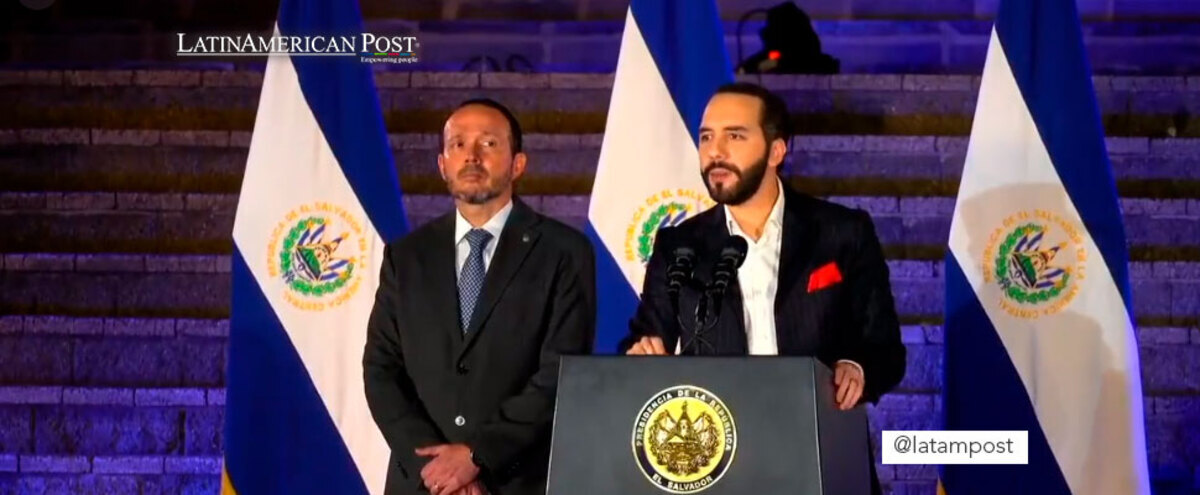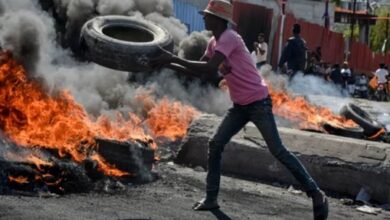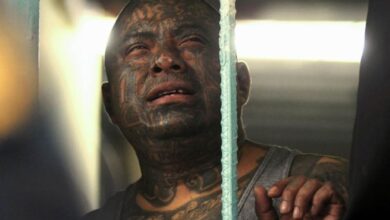What is Bukele Risking with His Anti-Violence Strategy in El Salvador?
There are already several international organizations that have accused the Salvadoran government of violating the human rights of prisoners in the midst of the anti-violence strategy in El Salvador. Will there be investigations or sanctions against Nayib Bukele?

Photo: TW-nayibbukele
LatinAmerican Post | Christopher Ramírez Hernández
Escucha este artículo
Leer en español: ¿A qué se arriesga Bukele con su estrategia antiviolencia en El Salvador?
Since last March 27, El Salvador has been experiencing a true moment of a social and political crisis after the president of this country, Nayib Bukele, decreed a state of exception with which he seeks to have an anti-violence strategy in El Salvador, attacking, precisely, to the gangs that for a few months have once again plagued the Central American country.
However, there are already several citizen complaints that have arisen against Bukele and his government. According to figures from the executive officer, since the beginning of the state of emergency, more than 6,000 people have been accused of participating in violent acts within Salvadoran gang groups. However, several civilians assure that there are many "false positives" that have fallen into this new judicial strategy.
Faced with all these criticisms, complaints, and alleged "threats", as Bukele has called it, in his capacity as president, he assured that "the criminals who are outside that want to start taking revenge on honest people at random ”, will be responsible for their alleged accomplices not having “not even a meal in prison”.
"And I don't care what international organizations say" were the words with which Nayib Bukele confronted the criticism that has already come from various NGOs, especially those related to Human Rights. For the president, both the Inter-American Commission on Human Rights (IACHR) and journalists are "partners of the gang members" and these, in turn, are the "armed wing" of the human rights organizations present in the country.
“Ustedes desatan una ola de criminalidad y nosotros quitamos la comida en las cárceles. Así que mejor estense tranquilos y déjense arrestar o les juro por Dios que no comen ni un grano de arroz”:El presidente de El Salvador, Nayib Bukele, a los presos por el aumento de homicidios pic.twitter.com/hfNpjzwn1P
— Última Hora Col (@ultimahorapp) 5 de abril de 2022
“This is Barbaric”
One of the first organizations to speak out was Human Rights Watch (HWR), which urged international entities such as the Organization of American States (OAS) and the European Union (EU) to categorically reject what, according to them, are judicial, social and policies of the Salvadoran Government against its own population, especially those deprived of their liberty.
"We need strong pronouncements from the OAS, the European Union (…) and also from the governments of the region because it is not possible that there is not a unanimous condemnation at a global level in the face of the barbarities that we are seeing in El Salvador," expressed on April 5 Tamara Taraciuk, acting director for the Americas of HWR.
Likewise, he branded the state of emergency decreed by Bukele as a mockery of democracy in El Salvador. In this implicit way, he noted that what is being experienced today in this country is the beginning of a dictatorial regime commanded by the Central American president. "Instead of strengthening democratic institutions, which are important to curb abuse, the government has weakened judicial independence and that makes justice more difficult for all Salvadorans, including victims of violence," added Taraciuk.
Hoy le envié esta carta al Pdte. @nayibbukele .
Sus tuits tergiversan las posiciones de Human Rights Watch.
Le solicité una reunión para conversar sobre la preocupante situación de los derechos humanos en El Salvador y los desafíos del país en materia de seguridad. pic.twitter.com/FrTuUgcq0q
— Tamara Taraciuk (@TamaraTaraciuk) 2 de abril de 2022
The same position is held by Amnesty International (AI), an organization that considers what happened in El Salvador as a scenario in which human rights violations are the order of the day. "Human rights violations cannot be the solution to violence, they only deepen the serious situation, revealing a context of abuses and arbitrariness, from which there is no return," says Erika Guevara Rosas, director for the Americas at AI.
It should be remembered that days after the state of emergency began, the National Police of El Salvador published a video on its Twitter account in which the torture to which the prisoners are subjected can be seen, being shot down by the uniformed men, even putting their feet on their heads.
Although the recording was deleted seconds after the Public Force uploaded it to the social network, several accounts managed to download it before its deletion, so its distribution was swift, even reaching international organizations, such as the UN itself. For the United Nations, this type of situation should be considered torture, since it violates in every way the human rights of the people imprisoned.
“We remind El Salvador that the right to life, the right not to be subjected to torture, the principles of a fair trial and the presumption of innocence, as well as the procedural guarantees that protect these rights, apply at all times, including states of exception,” said the speaker for the United Nations High Commissioner for Human Rights, Liz Throssell, through a press release.
You can also read: Nayib Bukele: from a critic of Venezuela to a partner of its allies
However, it is important to remember that although conventions against torture have been developed, both by the UN and the OAS, these organizations can do no more than investigate and denounce, but not punish. In fact, international entities find their hands tied when it is the Constitution of El Salvador itself that, to a certain extent, allows these acts of injustice, since the exceptional regime gives rise to the Legislative Assembly suspending some constitutional rights in the midst of extreme circumstances of violence such as those in the country, as dictated by the Magna Carta itself.
“We recognize the challenges posed by gang violence in El Salvador and the duty of the State to guarantee security and justice. However, it is imperative that this be done in accordance with international human rights law,” Throssell added, without clarifying whether or not investigations will be launched into the torture of prisoners in this nation.
What has been thought of investigating is the abusive use of the Pegasus spy program, which according to the IACHR " is being used as a weapon to silence journalists in El Salvador and around the world." A hearing will be held in March to discuss this issue and learn about the measures to be taken in the face of this situation of dictatorial order in El Salvador.





